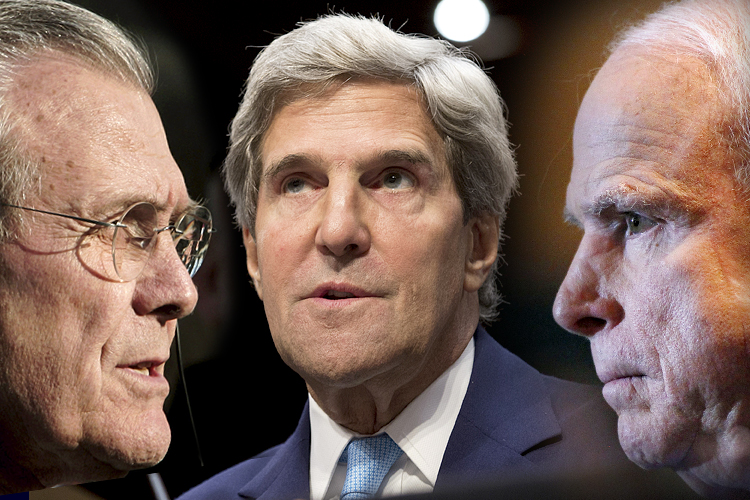As President Obama apparently submits to domestic and international pressure to back off his plan for an immediate war with Syria, prepare to hear the standard Multidimensional Chess™ talking point.
You’ve heard this one before — it’s the one from partisans that pretends every good idea their preferred politician opposed but is then forced to embrace was always that politician’s idea all along. As the Atlantic’s James Fallows put it, it portrays Obama as “a chess master who always sees several moves ahead of his opponents.” In that chess game, seemingly stupid moves are actually brilliant calculations designed to create a chain reaction. We are thus asked by these partisans to believe that every dumb, corrupt or misguided position their preferred politician takes is really just a secretly brilliant plot to achieve that politician’s real goal of driving the policy debate to a better place.
On Syria, this narrative began in earnest in advance of the president’s scheduled Oval Office address tonight. A day before the speech, as the Russia/U.N. plan emerged, Obama’s chief spinmeister David Axelrod took to twitter to ask “If POTUS hadn’t threatened credible military response, does anyone believe Russia and Syria would be coming forward now? No time to falter.”
In this most absurd version of the Multidimensional Chess story, the president proposed a war with Syria not because he wanted a war with Syria, but because he always wanted to prevent a war with Syria. More specifically, his administration cited World War II and made a full-court press in Congress for war not to actually start a war, but merely to prompt Russia to intervene to prevent a war. You see, it was an antiwar play all along!
Partisans’ objectives in forwarding such Orwellian newspeak is always twofold: 1) To always cast the preferred politician in a good light, and 2) to always portray the preferred politician as an all-powerful, all-knowing ruler.
Though the former objective isn’t surprising, it is a bit sad, especially when it is endorsed by rank-and-file activists. It is a product of a tribalist red-versus-blue psychology that convinces way too many Americans to organize their political activism around parties and individual politicians rather than around principles and policy preferences.
As evidence of how pervasive that psychology is, simply watch for the same Obama partisans who previously cheered on Obama proposing a Syria war now inevitably cheer on Obama proposing to possibly avert a Syria war — and cheer on the reversal without so much as apologizing for so vehemently pressing the previous position. The Multidimensional Chess theory, in fact, provides a rationale for not apologizing; as Axelrod’s comment shows, it allows partisans to tell themselves that in blindly backing whatever contradictory positions their Dear Leader assumes, they backed the right policy because the contradictions were all part of The Plan.
That gets to the latter objective of the Multidimensional Chess propaganda — the one that seeks to cast the president as a godlike emperor whose reversals, contradictions and shifts are always a product of prescience and calculation, and couldn’t possibly be a product of pressure from the supposedly lowly, weak and otherwise pathetic rabble.
As the debate over Syria shows, the problem with this line of logic is both its obvious inaccuracy and its deeper hostility to any kind of democratic process.
In terms of basic accuracy, for all that we will likely hear about the Obama administration supposedly always trying to avoid war with Syria, the verifiable evidence says exactly the opposite. In speeches, TV interviews and lobbying meetings with congressional lawmakers, the administration has been pushing for war with no caveats. Only when congressional and public opposition to that war began to look insurmountable did the administration suddenly change its tune and start seeking out a path that avoids a military confrontation. In other words, some modicum of a democratic process actually worked to prioritize what the public — rather than D.C. foreign policy elites — actually wanted.
Admitting that, though, admits that a president is not a king. It further admits that the lowly rabble isn’t so lowly and that — even with a weakened antiwar movement — it actually still has some agency. That’s frightening to elites in Washington who, for all the high-minded rhetoric, actually cannot stand democracy and the attendant limits on their unilateral power. It is also grotesque to hardcore partisans who see things in “with us or against us” terms, public will be damned.
Neither group wants to allow ordinary Americans or their congressional representatives to actually believe they have any decision-making power over stuff as Serious and Important as war and peace. Such notions are too subversively empowering to those who might curtail their power and embarrass their preferred politician. So the Multidimensional Chess argument selectively appropriates credit for turns of events in order to make sure the masses — in this case, the antiwar masses — never get to feel so empowered in the first place.
In the short term, of course, it doesn’t matter how a misguided, costly and destructive war is averted as long as it is, indeed, averted. But in the long term, the story of such a turn of events does matter because it shapes the political environment when the next proposal for war inevitably arises.
Forwarding the fantasy that recent decisions about Syria were solely dictated by the all-knowing Dear Leader forwards the idea that antiwar opposition was not important. That Multidimensional Chess argument, in turn, suggests to opponents of future wars that their opposition is futile — even though as this week shows, the success of that opposition was absolutely critical. Indeed, the opposition — not some fantastical Multidimensional Chess move by a monarch — is why there now seems to be a possibility of avoiding yet another war in the Middle East.


